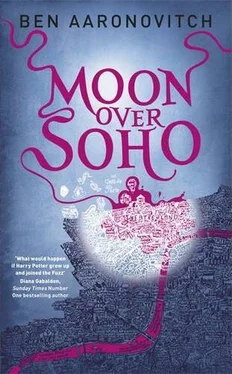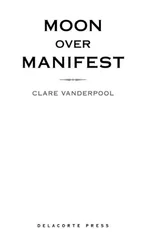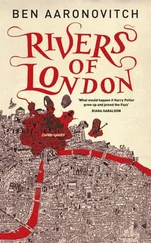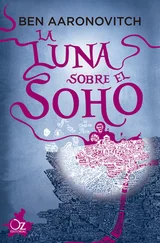I asked about other countries — China, Russia, India, the Middle East, Africa. I couldn’t believe that they hadn’t at least some kind of magic. Nightingale admitted that he didn’t really know, but had the good grace to sound embarrassed.
“The world was different before the war,” he said. “We didn’t have this instantaneous access to information that your generation has. The world was a bigger, more mysterious place — we still dreamed of secret caves in the Mountains of the Moon, and tiger hunting in the Punjab.”
When all the map was red, I thought. When every boy expected his own adventure and girls had not yet been invented.
Toby barked as we overtook a juggernaut full of God knows what going God knows where.
“After the war it was as if I was waking up from a dream,” said Nightingale. “There were space rockets and computers and jumbo jets and it seemed like a ‘natural’ thing that the magic would go away.”
“You mean you didn’t bother looking,” I said.
“It was just me,” he said. “And I was responsible for the whole of London and the southeast. It never occurred to me that the old days might come back. Besides, we have Dunlop’s books so we know his teacher wasn’t from some foreign tradition — this is a home-grown black magician.”
“You can’t call them black magicians,” I said.
“You realize that we’re using black in its metaphorical sense here,” said Nightingale.
“It doesn’t matter,” I said. “Words change what they mean, don’t they? Some people would call me a black magician.”
“You’re not a magician,” he said. “You’re barely even an apprentice.”
“You’re changing the subject,” I said.
“What should we call them?” he asked patiently.
“Ethically challenged magical practitioners,” I said.
“Just to satisfy my curiosity, you understand,” said Nightingale, “given that the only people ever likely to hear us say the words black magician are you, me, and Dr. Walid, why is changing them so important?”
“Because I don’t think the old world’s coming back anytime soon,” I said. “In fact, I think the new world might be arriving.”
OXFORD IS a strange place. As you go through the outskirts it could be any city in Britain, the same Edwardian suburban build, fading into Victorian, with the occasional mistake from the 1950s, and then you cross the Magdalen Bridge and suddenly you’re in the biggest concentration of late-medieval architecture this side of the eighteenth century. Historically it’s impressive, but from a traffic management perspective it meant it took almost as long to thread our way through the narrow streets as it did to drive up from London.
John Radcliffe, Royal physician to William and Mary, was famous in his own time for reading very little and writing almost nothing. So it stands to reason that one of the most famous libraries in Oxford was his creation. The Radcliffe Science Library is housed in a circular domed building that looks like St. Paul’s with the extraneous religious bits cut off. Inside was a lot smoothly carved stonework, old books, balconies, and the strained hush of young people being unnaturally quiet. Our contact was waiting for us by a notice board just inside the entrance.
Outside the big cities my very appearance can sometimes be enough to render certain people speechless. So it was with Harold Postmartin DPhil, FRS, curator of special collections at the Bodleian Library, who had clearly been expecting Nightingale to introduce someone “different” as the new apprentice. I could see him trying to parse the phrase but he’s colored in a way that wouldn’t cause offense and failing. I put him out of his misery by shaking his hand; my rule of thumb is if they don’t physically flinch from touching you, then eventually they’ll make the adjustment.
Postmartin was a stooped white-haired gentleman who looked much older and frailer than my father but had a surprisingly firm handshake.
“So you’re the new apprentice,” he said and managed to avoid it sounding like an accusation. I knew then we were going to be fine.
Like all modern libraries the visible bit of the Radcliffe was the tip of an iceberg; the bulk of the actual collection was submerged under Radcliffe Square in chambers filled with books and the intrusive hum of modern climate control. Postmartin led us down a series of whitewashed brick passages to a no-nonsense metal security door marked NO ADMITTANCE. Postmartin used a swipe card on the security pad and punched in a combination. The door unlocked with a solid clunk and we trooped in to find a chamber with exactly the same shelves and climate control as the rest of the collection. There was a single institutional desk with a top bare except for what looked like the product of a loveless marriage between an early Mac and an IBM PC.
“It’s an Amstrad PCW,” said Postmartin. “Before your time, I suppose.” He sat down on a purple molded plastic chair and booted up the antique. “No hardware connections, no USB ports, three-inch floppy disks that they don’t make anymore — this is security through obsolescence. Much like the Folly itself. They cannot hack, if I’m using the term correctly, what they cannot access.”
The screen was an alarming green color, monochrome I realized, like something from an old film. The three-inch disk actually clunked when the machine started to access it.
“Do you have the copy of the Principia ?” asked Postmartin.
I handed it over and he started to leaf slowly through the pages. “Every copy at the library was marked in a unique way,” he said and stopped at a particular page and showed it to me. “You see there, that word has been underlined.”
I looked; it was the word regentis . “Is that significant?” I asked.
“We shall see,” he said. “Perhaps you should write it down.”
I wrote the word in my police notebook and as I did I noticed Postmartin furtively scribbling something on a pad he thought was out of my sight. When I was done he flicked through the pages until he found another mark, and again I noted down the word, pedem , and again I saw him write something else on his pad. We repeated the process three more times and then Postmartin asked me to read the words back.
“Regentis, pedem, tolleret, loco, hostium,” I said.
Postmartin regarded me over the rim of his glasses. “And what do you think that signifies?” he asked.
“I think it signifies that the page numbers were more significant than the words,” I said.
Postmartin looked crestfallen. “How did you know?”
“I can read your mind,” I said.
Postmartin looked to Nightingale. “Can he?”
“No,” said Nightingale. “He spotted you writing the numbers down.”
“You’re a cruel man, Constable Grant,” said Postmartin. “No doubt you shall go far. The actual words, as you surmised, are irrelevant, but if the page numbers are arranged as a single alphanumeric string they form a unique identification number. Which we can enter into our venerable friend here and voilà … ”
The PCW’s screen displayed a page of ugly green text, title, author, publisher, shelving notation, and a short list of the people who’d borrowed the book. The last person listed was Geoffrey Wheatcroft, who’d signed it out in July 1941 and never returned it.
“Oh,” said Postmartin in surprise. “Geoffrey Wheatcroft? Hardly what I’d call a nefarious fellow. Not your criminal type at all, is he, Thomas?”
“You know him?”
“I knew him,” said Postmartin. “He died last year — we were both at the funeral, although Thomas had to come as his own son to allay suspicions.”
Читать дальше












